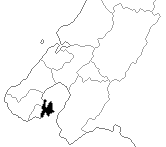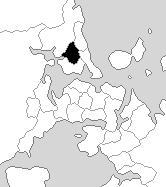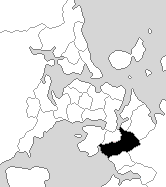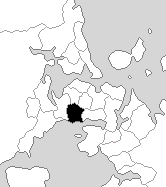
Miramar was a New Zealand parliamentary electorate in the south-eastern suburbs of Wellington. It was created in 1946, replacing Wellington East, and was replaced by Rongotai for the first MMP election of 1996.
Hauraki is a former New Zealand parliamentary electorate, from 1928 to 1987 and 1993 to 1996. In the 1987 general election it was renamed Coromandel, the name that had been used from 1972 to 1981. In 1993 it reverted to Hauraki, but became Coromandel again for the first MMP election in 1996.
Waimarino was a New Zealand parliamentary electorate that existed from 1911 to 1954, and from 1963 to 1972. It was rural in nature and was represented by four Members of Parliament.

Panmure is a former New Zealand parliamentary electorate in the southern suburbs of the city of Auckland, from 1984 to 1996. In the four parliamentary terms of its existence, it was first represented by Bob Tizard of the Labour Party, and then by his daughter Judith Tizard.
Otahuhu is a former New Zealand parliamentary electorate in the southern suburbs of the city of Auckland, from 1938 to 1963, and then from 1972 to 1984.

Glenfield was a New Zealand parliamentary electorate for four terms, from 1984 to 1996. It was represented by two members of parliament, first Judy Keall of the Labour Party, and then Peter Hilt of the National Party. Hilt defected to United New Zealand in 1995.

Birkenhead was a New Zealand Parliamentary electorate on Auckland's North Shore from 1969 to 1996, when it was absorbed into the Northcote electorate.
Waitemata was a New Zealand parliamentary electorate, from 1871 to 1946, and then from 1954 to 1978. It was represented by 18 members of parliament.

Otara was a New Zealand parliamentary electorate in Auckland, from 1984 to 1996. It existed for four parliamentary terms and was represented by three members of parliament, two from Labour and one from National.
Grey Lynn is a former New Zealand parliamentary electorate, in the city of Auckland. It existed from 1902 to 1978, and was represented by nine Members of Parliament.
St Kilda is a former New Zealand parliamentary electorate. It existed from 1946 to 1996 and was represented by four Members of Parliament.
West Coast is a former New Zealand Parliamentary electorate, from 1972 to 1996.
Tongariro is a former New Zealand parliamentary electorate, from 1984 to 1996. During the four parliamentary terms of its existence, it was represented by three members of parliament.
West Auckland is a former New Zealand parliamentary electorate on the western outskirts of Auckland, created for the 1984 election from part of the former Helensville electorate. The electorate was abolished for the 1993 election, and split between Henderson and Waitakere electorates.
Marlborough is a former New Zealand parliamentary electorate, in the Marlborough region at the top of the South Island. It existed from 1938 to 1996, and was represented by five Members of Parliament.

Roskill was a New Zealand parliamentary electorate, from 1919 to 1996. The electorate was represented by eight Members of Parliament.
Dunedin West was a New Zealand parliamentary electorate, in the city of Dunedin. It existed for three periods between 1881 and 1996 and was represented by seven Members of Parliament.

Remuera is a former New Zealand parliamentary electorate, in the city of Auckland. It existed from 1938, when it replaced the Parnell electorate, until 1996. It was consistently held by members of the National Party.
Ponsonby was a parliamentary electorate in Auckland, New Zealand from 1887 to 1890 and from 1946 to 1963. The Ponsonby electorate was represented by two Members of Parliament.
Hastings was a parliamentary electorate in the Hawke's Bay Region of New Zealand from 1946 to 1996. The electorate was represented by nine Members of Parliament. The Hastings electorate was a typical bellwether electorate, frequently changing between the two main parties.







